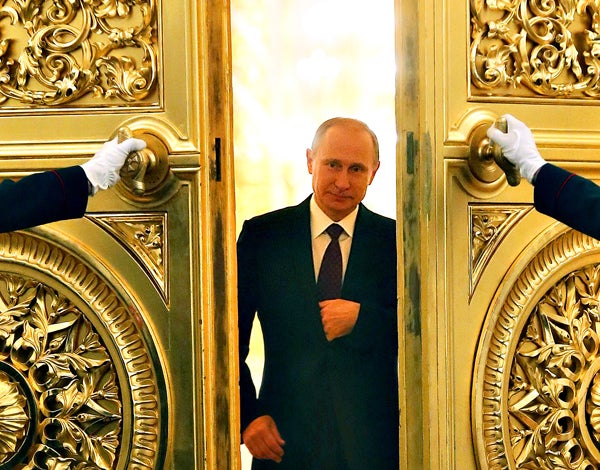

Whatever the result of the forthcoming EU referendum, it’s unlikely to have any effect on one of our most determined immigrant populations — the thousands of HNW Russians who annually flee Vladimir Putin’s wars and laws in favour of Britain.
These Russians are now coming in ever-greater numbers, bringing their money with them, John Underwood goes in search of the £1 billion that makes its illicit way from Moscow to London each month. He finds an increasingly nervous middle class eager to leapfrog across continental Europe and join the quarter of a million Russians already here in the capital.
While Putin might be glad that fractious ‘liberals’ are fleeing his dark empire, he is presiding over not just capital flight but a brain drain too. Entrepreneurial and forward-thinking, these émigrés are those Russia can ill afford to lose while its vestiges of capitalism look ever more tattered. If Putin has some idea of where growth may come from without these businesspeople, even as the oil price languishes, we (and the Russian people) would like to hear it.
Russia is not the only place to be losing its brightest and best. Ireland has seen 400,000 leave since the financial crash, for example. London has had an influx from France — not just those in financial services whose kids attend the Lycée in South Kensington, but also those from poor North African immigrant backgrounds, who come here because the institutional racism at home keeps them down.
There are in these brain drains two particular lessons for London. First, of course, is that we need to continue welcoming those leaving inhospitable, unproductive or downright hostile countries, whether inside or outside the EU. Cutting the number of migrants who come here when migrants (European ones anyway) are net contributors to our economy is folly.
The second is that wealth can’t be allowed to hollow out the city. This is not for a second to make London hostile to HNWs, but to remember that a city must be diverse, with housing, entertainment and opportunities for people of every stratum of society. When London house prices spike, we threaten the non-HNW native and immigrant populations who make the city what it is. London is for everyone.
If this city is to remain a cultural as well as a financial hub, we must ensure that an oligarch’s salary isn’t a condition of residence.
—
Wealth creators from all over the world come to London to hire private bankers and wealth managers to look after their assets. From Indian billionaires to Russian oligarchs, Chinese industrialists to Middle Eastern royals, international UHNWs value the expertise and service they can find in London — just ask the top 50 wealth managers in town and they will tell you that a significant part of their business now comes from abroad.
But if they want to appeal to what is arguably one of the most important groups of wealth creators of the past decade — Silicon Valley’s tech entrepreneurs — British bankers could do worse than learning a few lessons from their Californian colleagues, whom Giulia Cambieri meets.
They are so much more than wealth managers. If London’s wealth managers feel daring because they’re offering property-club investment opportunities to their clients, one look at what bankers in San Francisco can do will leave their jaws in freefall. Firms like Bezos Expeditions, which belongs to Amazon’s founder and CEO Jeff Bezos, and Iconiq Capital, the private investment office of Mark Zuckerberg and Sheryl Sandberg, are about so much more than managing money: they act as social networks, discoverers of deals and, most importantly, venture capitalists. This gives private clients access to talent and expertise as well as opportunities to grow their own business.
Their British colleagues should take note. Such dynamism would serve well clients suffering under sluggish markets. They might even follow the Bay Area’s lead and set up solo, against our current trend for consolidation, to offer a truly personal alternative to the company men. As firms agglomerate, innovation gets trampled. The private-client community needs an injection of Californian can-do.
—
One of the few times the Spear’s editorial team have played a board game together, it was called Billionaire Tycoon. It didn’t end well. In this game, you start by buying hot-dog shacks and work your way up to oil rigs, trading and tricking your way to the top. By the end of the night, we had seen some distinctly tyrannical behaviour from one writer, who acquired the nickname ‘The General’.
We tell you this by way of showing how even a game with fake money produces wild reactions. It’s unsurprising, then, that the reactions are so much more extreme when real-life billionaire tycoons play Monopoly with actual properties. (We’re not referring to the Qataris putting — or at least restoring — a house on Park Lane.)
As Mark C O’Flaherty has observed on St Barths, the Caribbean island’s hotels are trading hands as if they were nothing more than cards in a game — from the Oetker family to the Arnault family, from one billionaire to another. This competition doesn’t seem to have damaged guests’ experiences, judging by Mark’s report, which is a tribute to both owners and staff.
But perhaps billionaires ought to consider other games which might teach them more than the virtues of rapacious double-dealing and capitalist hunger. There are plenty of favourites which involve teams and no incentive to thwart or deceive: Pictionary for visual communication, charades for verbal, and even the Hat Game for memory. (If you’re not familiar with the Hat Game, Google it instantly.)
We’re not giving you these suggestions because Spear’s is concerned that your kids aren’t sufficiently entertained or because we’ve suddenly turned into an all-must-have-prizes publication, but because it would be nice if life — particularly the UHNW life — were a little more like Pictionary and a little less like Monopoly. Mind you, no one ever lost money putting a hotel on Mayfair.






